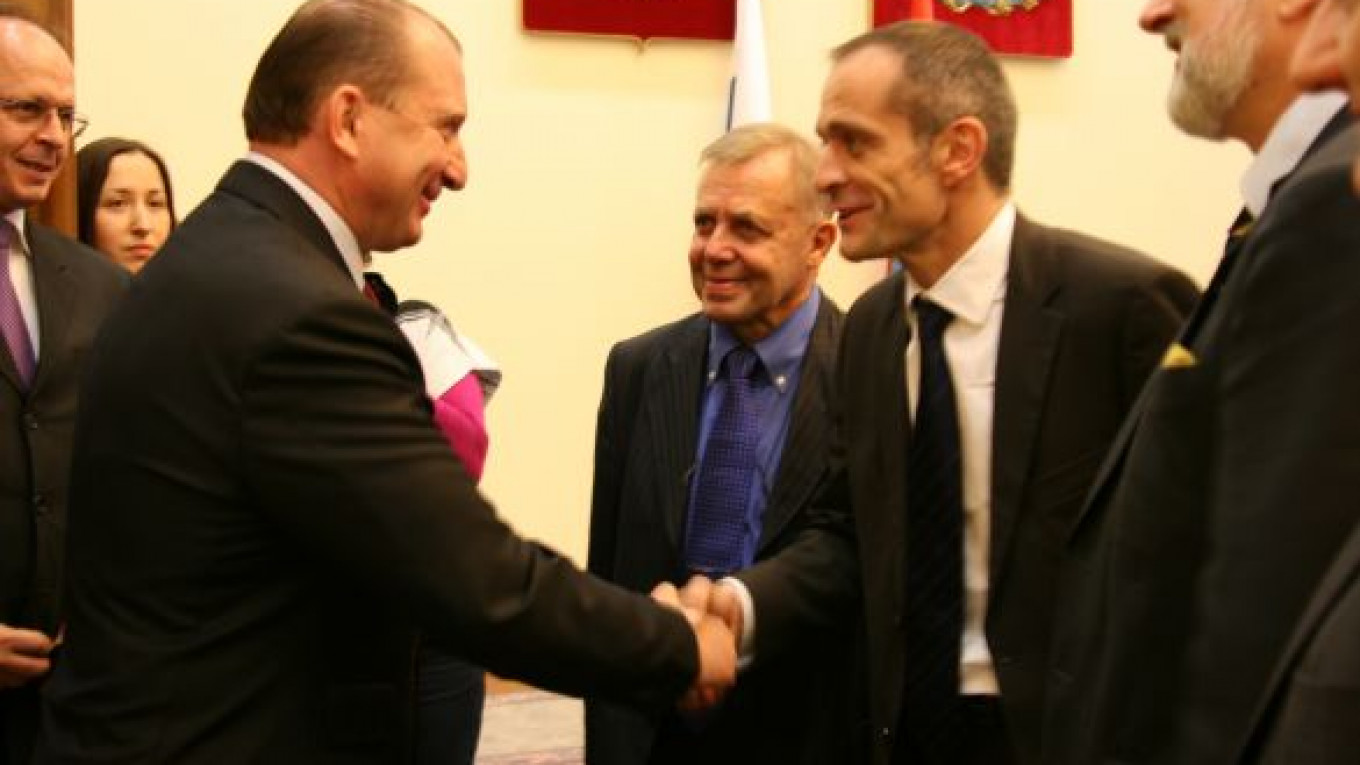SAMARA — French power company Schneider Electric and its Russian joint venture partner, Electroshield, will be "closely involved" in the $3 billion modernization of three Rosneft refineries, Schneider Electric president Jean-Pascal Tricoire said Friday.
Rosneft has allocated $3 billion to upgrade the Samara region refineries over the course of the next five years, Governor Vladimir Artyakov said. Local authorities say they would like to see a domestic company involved in the project.
"This joint venture is now viewed as our [local] company," Artyakov said, encouraging Schneider Electric's involvement in the project and promising his support.
"If critical situations appear, I would like to ask you to get in touch with me directly to solve problems," the governor told Schneider Electric's top management in Samara, a Volga River city in central Russia.
"We are undoubtedly interested and will get closely involved in Rosneft's refineries," Tricoire said.
The governor also noted that he was "especially interested" in Schneider Electric's energy-efficiency initiatives.
Only two days earlier, President Dmitry Medvedev reinforced the importance of his energy plan at a modernization commission session.
Schneider Electric, which specializes in low- and medium-voltage distribution gear, announced last week that it was creating a joint venture with Samara-based Electroshield, which also creates medium-voltage products.
Tricoire said the partnership would help Electroshield enter the world market and strengthen Schneider Electric's position in Russia.
Samara will be home to Schneider Electric's largest production facilities, making Russia the company's second-biggest European market after France in terms of production volume, Tricoire said.
The initial price tag on the transaction was 10.7 billion rubles ($347 million) for the 50 percent. Laslo Markotan, Electric Schneider's director in the CIS and Russia, told reporters that the figure included Electroshield's debt.
Schneider Electric had previously said the deal did not include Electroshield's debt.
There are a few issues that the partners must still to resolve, including branding of the joint venture's products, managers said.
Andrei Polovinkin, who will head the joint venture, said the matter was "complex" and had not yet been resolved. Depending on the market, jointly made products could be marketed under different names, he said.
Tricoire declined to comment on the possibility of buying out its Russian partner. Schneider Electric is planning to "focus on the current joint venture," he said in response to a question from The Moscow Times.
The French electric giant had worked with Electroshield in different capacities for 15 years before the two started talks about "closer cooperation" five years ago and formed a partnership on innovation last year.
Since then, they have worked on 19 projects, including "modernizing all of Cuba" and completing all electric work on the Tatarstan-based refinery TANEKO, the company said.
"You need to get in contact with Rosneft. … We already have an agreement with them that Samara companies will be the first in line to modernize these [refineries]," Artyakov said. "It is interesting for us because this means both new jobs and taxes."
Local authorities and joint venture partners were joined by the French ambassador to Russia, Jean de Gliniasty, who said his country "has always believed in Russia, even in the midst of the economic crisis in 2009."
In the first half of 2010, France invested $312 million into Samara's economy, Artyakov said. And according to the ambassador, the cash flow will not stop there.
He also noted Renault's investment in Samara-based automaker AvtoVAZ.
"French investments get centralized where the administration works, so this comes as no surprise that Samara has become so interesting to our investors," de Gliniasty said.
A Message from The Moscow Times:
Dear readers,
We are facing unprecedented challenges. Russia's Prosecutor General's Office has designated The Moscow Times as an "undesirable" organization, criminalizing our work and putting our staff at risk of prosecution. This follows our earlier unjust labeling as a "foreign agent."
These actions are direct attempts to silence independent journalism in Russia. The authorities claim our work "discredits the decisions of the Russian leadership." We see things differently: we strive to provide accurate, unbiased reporting on Russia.
We, the journalists of The Moscow Times, refuse to be silenced. But to continue our work, we need your help.
Your support, no matter how small, makes a world of difference. If you can, please support us monthly starting from just $2. It's quick to set up, and every contribution makes a significant impact.
By supporting The Moscow Times, you're defending open, independent journalism in the face of repression. Thank you for standing with us.
Remind me later.






